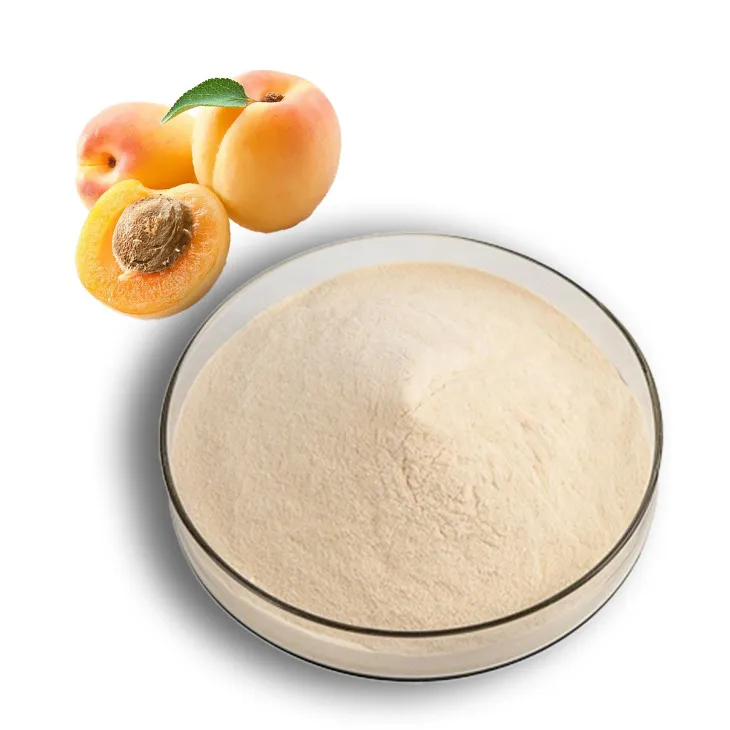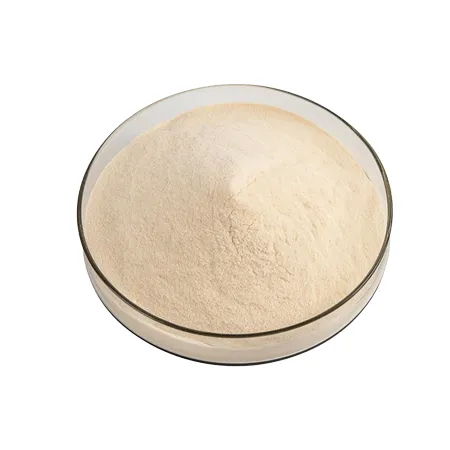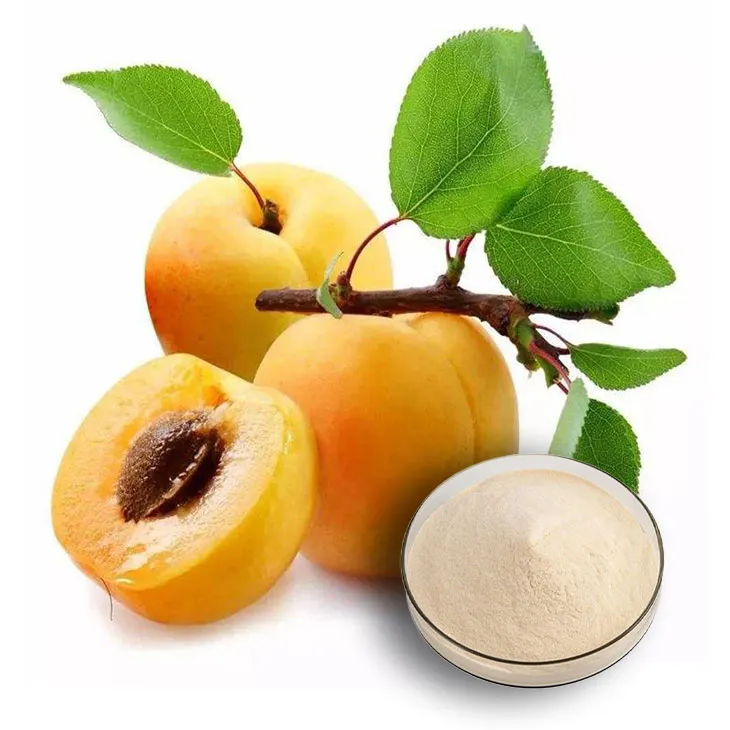- 0086-571-85302990
- sales@greenskybio.com
Apricot powder: Uses, Advantages, Manufacturing Processes
2024-11-12

1. Introduction
Apricot Powder is a remarkable substance that has gained significant attention in recent years. It is derived from apricots, a fruit known for its delicious taste and numerous health benefits. This powder has found its way into a variety of industries, thanks to its unique properties. It is not only a natural product but also offers a wide range of applications, making it a multi - faceted wonder in the world of ingredients.

2. Uses in Cosmetics
2.1 Exfoliation
One of the primary uses of Apricot Powder in cosmetics is for exfoliation. The fine particles of the powder work gently on the skin's surface to remove dead skin cells. This process helps to unclog pores, allowing the skin to breathe better. Exfoliation with Apricot Powder can leave the skin feeling smoother and looking more radiant. It is a natural alternative to some of the harsher chemical exfoliants available in the market, making it suitable for those with sensitive skin as well.
2.2 Nourishment
Apricot powder is also rich in nutrients that are beneficial for the skin. It contains vitamins such as vitamin A, which is known for its role in promoting healthy skin cell turnover. Vitamin E, another component of apricot powder, acts as an antioxidant, protecting the skin from damage caused by free radicals. These nutrients are absorbed by the skin during application, providing nourishment and helping to maintain the skin's elasticity and overall health. In addition, apricot powder can also help to moisturize the skin, preventing it from becoming dry and flaky.

3. Uses in Food
3.1 Flavor Enhancement
In the food industry, apricot powder is highly valued for its ability to add a unique flavor. It has a sweet and slightly tangy taste that can enhance a variety of dishes. For example, it can be used in baking to add a fruity flavor to cakes, cookies, and muffins. It can also be added to smoothies, yogurts, and ice creams, giving them a delicious apricot - like taste. The powder can be used as a substitute for fresh apricots when they are out of season, allowing consumers to enjoy the flavor of apricots all year round.
3.2 Nutritional Boost
Like in cosmetics, apricot powder used in food also provides a nutritional boost. It is a good source of dietary fiber, which aids in digestion and helps to keep the digestive system healthy. Additionally, it contains minerals such as potassium, which is important for maintaining proper heart function and fluid balance in the body. Incorporating apricot powder into food products can be an easy way to increase the nutritional value of these items, especially for those who may not consume enough fruits in their diet.

4. Advantages
4.1 Natural Ingredient
One of the major advantages of apricot powder is that it is a natural ingredient. In a time when consumers are increasingly conscious about the products they use on their skin and consume in their diet, the natural origin of apricot powder makes it an attractive option. It is free from artificial colors, flavors, and preservatives, which are often associated with potential health risks. Using natural ingredients like apricot powder can also be beneficial for the environment, as it reduces the reliance on synthetic chemicals that may have a negative impact on the ecosystem.
4.2 Rich in Nutrients
As mentioned earlier, apricot powder is rich in a variety of nutrients. These nutrients not only contribute to its uses in cosmetics and food but also offer overall health benefits. The vitamins, minerals, and antioxidants present in apricot powder play important roles in maintaining good health. For instance, the antioxidant properties can help to boost the immune system, reducing the risk of diseases. The vitamins and minerals are essential for proper body function, including maintaining healthy skin, hair, and nails, as well as supporting the normal functioning of internal organs.
5. Manufacturing Processes
5.1 Selection of Apricots
The manufacturing process of apricot powder begins with the careful selection of apricots. Only high - quality apricots are chosen, typically those that are ripe and free from blemishes or signs of disease. The variety of apricot can also impact the final product, with some varieties being more suitable for powder production due to their flavor and nutrient content. Growers need to ensure that the apricots are harvested at the right time to obtain the best quality fruit for powder making.
5.2 Drying
Once the apricots are selected, the next step is drying. There are several methods of drying apricots, including sun drying and mechanical drying. Sun drying is a traditional method that has been used for centuries. It involves spreading the apricots out in the sun and allowing the natural heat and air circulation to remove the moisture from the fruit. However, this method can be time - consuming and is dependent on weather conditions. Mechanical drying, on the other hand, uses specialized equipment such as dehydrators or drying ovens. This method is more controlled and can be faster, ensuring that the apricots are dried evenly and quickly to preserve their nutrients.
5.3 Grinding
After the apricots are dried, they are ground into a fine powder. The grinding process needs to be done carefully to ensure that the powder has a consistent texture. This is usually achieved using industrial grinders that can pulverize the dried apricots into a smooth powder. The fineness of the powder can be adjusted depending on the intended use. For example, in cosmetics, a finer powder may be required for better application on the skin, while in food, a slightly coarser powder may be acceptable depending on the recipe.
5.4 Quality Control
Throughout the manufacturing process, quality control is crucial. Samples of the apricot powder are regularly tested for various parameters such as nutrient content, moisture level, and particle size. This ensures that the final product meets the required standards. Any batches that do not meet the quality criteria are rejected to maintain the overall quality of the apricot powder. Quality control also includes ensuring that the manufacturing process adheres to strict food safety and hygiene regulations, especially if the powder is intended for use in food products.
6. Conclusion
Apricot powder is truly a multi - faceted wonder with a wide range of uses in cosmetics and food. Its advantages, such as being a natural ingredient and rich in nutrients, make it an appealing choice for both consumers and manufacturers. The manufacturing process, which involves careful selection, drying, grinding, and quality control, ensures that the final product is of high quality. As the demand for natural and healthy products continues to grow, it is likely that apricot powder will find even more applications in the future, further establishing its importance in various industries.
FAQ:
Q1: What are the main uses of apricot powder in cosmetics?
Apricot powder in cosmetics can be used for gentle exfoliation. It helps remove dead skin cells from the surface of the skin, leaving it smoother. Also, it has nourishing properties. It can provide the skin with certain nutrients, which helps keep the skin in a healthy state.
Q2: How does apricot powder add flavor in food?
Apricot powder has a characteristic flavor that is both sweet and slightly tangy. When added to food, it imparts these unique taste elements. For example, in baking, it can enhance the flavor of cakes, cookies, or pastries. In beverages, it can add a distinct apricot - like taste.
Q3: What nutrients are rich in apricot powder?
Apricot powder is rich in vitamins such as vitamin A, which is good for eye health and skin health. It also contains dietary fiber which can help with digestion. Additionally, it may have some minerals like potassium which is important for maintaining proper heart function and fluid balance in the body.
Q4: What are the key steps in the manufacturing process of apricot powder?
The first step is the careful selection of apricots. Only high - quality apricots are chosen. Then, drying is carried out. This helps to reduce the moisture content and preserve the apricots. After drying, the apricots are ground into a fine powder. Quality control measures are usually in place during each step to ensure the final product is of high quality.
Q5: Why is the natural property of apricot powder considered an advantage?
Being natural makes apricot powder a favorable choice in both cosmetics and food. In cosmetics, natural ingredients are often preferred as they are less likely to cause skin irritations or allergic reactions compared to synthetic ingredients. In food, natural apricot powder is more appealing to consumers who are looking for products with fewer artificial additives and a more pure taste.
Related literature
- The Role of Apricot - Derived Ingredients in Cosmetics"
- "Apricot Powder in Culinary Applications: A Nutritional and Flavorful Addition"
- "Manufacturing High - Quality Apricot Powder: Best Practices"
- ▶ Hesperidin
- ▶ citrus bioflavonoids
- ▶ plant extract
- ▶ lycopene
- ▶ Diosmin
- ▶ Grape seed extract
- ▶ Sea buckthorn Juice Powder
- ▶ Beetroot powder
- ▶ Hops Extract
- ▶ Artichoke Extract
- ▶ Reishi mushroom extract
- ▶ Astaxanthin
- ▶ Green Tea Extract
- ▶ Curcumin Extract
- ▶ Horse Chestnut Extract
- ▶ Other Problems
- ▶ Boswellia Serrata Extract
- ▶ Resveratrol Extract
- ▶ Marigold Extract
- ▶ Grape Leaf Extract
- ▶ blog3
-
High purity olive leaf extract
2024-11-12
-
Lavender oil extraction method
2024-11-12
-
100% organic virgin sea buckthorn fruit oil
2024-11-12
-
Lotus leaf extract powder factory in China
2024-11-12
-
China aged garlic extract supplier
2024-11-12
-
Deer antler extract powder manufacturer
2024-11-12
-
Saw palmetto extract vs whole herb
2024-11-12
-
Maitake Mushroom Extract
2024-11-12
-
Tongkat Ali Extract
2024-11-12
-
Hops Extract
2024-11-12
-
Tongkat Ali Extract Powder
2024-11-12
-
Bamboo Leaf extract
2024-11-12
-
Ginseng Root Extract
2024-11-12
-
Ginger Extract
2024-11-12
-
Cassia Seed Extract
2024-11-12
-
Beetroot Powder
2024-11-12
-
Marigold Extract
2024-11-12





















